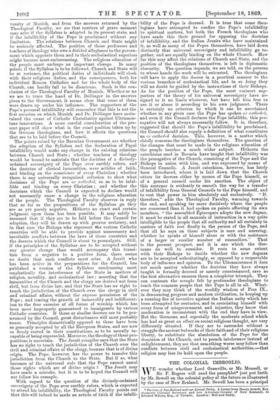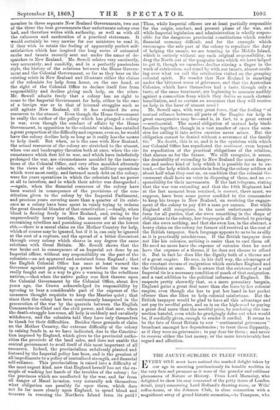THE COLONIAL IMBROGLIO.
WE wonder whether Lord Granville, or Mr. Monsell, or Sir F. Rogers will read the pamphlet* just put forth by Mr. Sewell on the colonial policy of the future as illustrated by the case of New Zealand. Mr. Sewell has been a principal • The Case of New Zealand and our Liberal Policy. A Letter from Henry Sewell, Esq (formerly Colonial Secretary and late Attorney-General of New Zealand), to Edward Wilson, Esq., of Victoria. London: Bell and Daldy. member in three separate New Zealand Governments, two out of the three the best governments that unfortunate colony ever had, and therefore writes with authority, as well as with all the calmness and moderation of a practical statesman. It would certainly be very unwise for our ministers to read it, if they wish to retain the feeling of apparently perfect self- satisfaction which has inspired the long series of animated snubs and taunts recently sent out under the name of de- spatches to New Zealand. Mr. Sewell relates very succinctly, very accurately, and candidly, and in a perfectly passionless style, the history of the relations between the Home Govern- ment and the Colonial Government, so far as they bear on the existing crisis in New Zealand and illustrate either the claims of the colonists for help from home, on the one hand, or the right of the Colonial Office to declare itself free from responsibility and decline giving such help, on the other. Mr. Sewell admits freely that a colony has no right to come to the Imperial Government for help, either in the case of a foreign war or in that of internal struggles such as still agitate New Zealand, till it has strained its own resources to the utmost. Even though the Home Government be really the author of the policy which has plunged a colony in war, even though the conduct of affairs by the Home Government, in opposition to the colonists' wishes, has entailed a great proportion of the difficulty and expense, even so, he would have the colony decline help so long as it really has the means to help itself. But when, as is the case with New Zealand, the actual resources of the colony are stretched to the utmost, when war and bankruptcy threaten both at once, when the cir- cumstances which first led to war, and which have indefinitely prolonged the war, are circumstances moulded by the instruc- tions of the Colonial Office, and very often moulded adversely to the views of the colonists, when the military operations which were most costly, and fastened much debt on the colony, were for years operations in which the colonists had no power at all to interfere, and in which their advice was disregarded ; —again, when the financial resources of the colony have been wasted in consequence of the provisions of the con- stitution given to the colony by the Imperial Parliament, and precious years covering more than a quarter of its exist- ence as a colony have been spent in vainly trying to redeem the great financial blunder of that constitution ; —finally, when blood is flowing freely in New Zealand, and, owing to the unprecedently heavy taxation, the means of the colony for restraining rebellion and punishing massacre are at the lowest ebb,—there is a moral claim on the Mother Country for help, which of course may be ignored, but if it is, can only be ignored at the cost of a rupture, and the spread of a bitter discontent through every colony which shares in any degree the same relations with Great Britain. Mr. Sewell shows that the war broke out in consequence of an Imperial act done by an Imperial officer, without any responsibility on the part of the colonists—an act approved and sustained from England ; that the English Colonial Office has once at least warned the Governor against patching up a peace before the war was really fought out in a way to give a warning to the rebellious natives,--that when the native policy was first thrown upon the Colonial Government by the Colonial Office, about five years ago, the Crown acknowledged its responsibility by agreeing to bear a considerable part of the expense of the measures thought requisite to keep the Maories quiet ; that since then the colony has been continuously hampered in the prosecution of the war by the quarrels between the English Commander-in-Chief and the civil power, and that now, when the death-struggle has come, all help is suddenly and cavalierly withdrawn, and the colonists told they have only themselves to thank for their difficulties. Besides these grounds of claim on the Mother Country, the extreme difficulty of the colony in raising funds is, as we have indicated, due to the Constitu- tion imposed by England, which gives to the provincial autho- rities the proceeds of the land sales, and does not enable the central government to avail itself of this most important of all resources. Indeed, the provincialism sedulously planted and fostered by the Imperial policy has been, and is the greatest of all impediments to a policy of centralized strength, and financial self-reliance. This provincialism is raised into a difficulty of the most urgent kind, now that England herself has set the ex- ample of washing her hands of the troubles of the colony ; for the provinces which are unaffected by the war, and far from all danger of Maori invasion, very naturally ask themselves what obligation can possibly lie upon them, which does not lie far more clearly upon England, to spend blood and treasure in rescuing the Northern Island from its peril?
Thus, while Imperial officers are at least partially responsible for the origin, conduct, and present phase of the war, and while Imperial legislation and administration is wholly respon- sible for the dangerous provincial constitutions which render financial economy difficult, and for the example which, encourages the safe part of the colony to repudiate the duty of helping the unsafe, we are trusting to the Middle Island, which is entirely without any such original responsibility, to drag the North out of the quagmire into which we have helped to get it, though we ourselves decline stirring a finger in the work of extrication, and stand by with our taunts, almost exult- ing over what we call the retribution visited on the grasping colonial spirit. No wonder that New Zealand is smarting under the bitterest sense of grievance, and that the Australian Colonies, which have themselves had a taste, though only a taste, of the same treatment, are beginning to murmur audibly against a connection from which they derive so much chronic humiliation, and so certain an assurance that they will receive no help in the hour of utmost need ?
Mr. Sewell says, with very great force, that the feeling " of mutual reliance between all parts of the Empire for help in great emergencies may be—and is, in fact, to a great extent —sentimental. The moral obligation of mutual help binds families together, though in a vast number of cases the occa- sion for calling it into active exercise never arises. But the obligation cannot be denied without a severance of the family tie." No doubt, this is so, and it is the cynicism with which our Colonial Office has repudiated the sentiment, even beyond its repudiation of the practical obligations of the relation, that alarms us for the future. We still recognize, it seems, the desirability of extending to New Zealand the most danger- ous and useless kind of help which it is possible for us to ex- tend,—the help which consists in lending the colony soldiers at about half what they cost us, on condition that the colonial Go- vernment shall have no voice in disposing of them, and no re- sponsibility for their movements. If the last telegram, stating that the war was extending and that the 18th Regiment had at the last moment been retained, is correct, there must, we suppose, have been some power confided to the commander to keep his troops in New Zealand, on receiving the engage- ment of the colony to pay £40 a man per annum. But while England still recognizes, in the most unfortunate possible form for all parties, that she owes something in the shape of obligations to the colony, her language is all directed to proving that she owes nothing, and that she even has, in the abstract, a heavy claim on the colony for former aid received at the cost of the British taxpayer. Such language appears to us to be as silly as it is practically mischievous. If the British taxpayer does not like his colonies, nothing is easier than to cast them off. He need no more have the expense of colonies than he need have the expense of a throne, if he does not choose to afford it. But in fact he does like the dignity both of a throne and of a great empire. He sees, in his dull way, the advantages of the constant stream of emigration which enriches England and the Colonies at once. He is aware that the existence of a real Imperial tie is a necessary condition of much of that emigration, and a vast addition to the political influence of England. He suspects pretty shrewdly that, as a mere pecuniary bargain, England gains a great deal more than she loses by her colonial empire, even though she has to put her hand in her pocket oftener than. she likes to help colonial misfortune. But the British taxpayer would be glad to have all this advantage and not pay its needful price, and so is on the high-road to paying a great deal more than the needful price, by rendering the con- nection hateful, even while he grudgingly doles out what would be, if cordially given, enough to render it cordial. It seems to be the fate of Great Britain to sow "sentimental grievances " broadcast amongst her dependencies ; to treat them flippantly, as if they were no grievances ; to pay dear for them ; and never to recover either the lost money, or the more irretrievably lost regard and affection.































 Previous page
Previous page